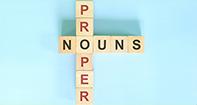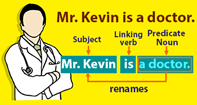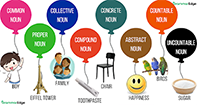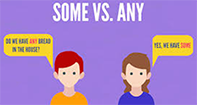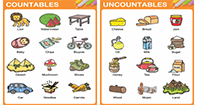Change Avatar
Countable and Uncountable Nouns
Countable and Uncountable Nouns
Understanding the difference between countable and uncountable nouns is an important element of language arts. Mastering these differences is a building block to more advanced language skills and may improve performance in other subjects, as language skills are necessary for all learning. Turtle Diary's Countable & Uncountable Nouns interactive basketball game provides short and varied exercises to keep children engaged and interested. The activity is kid-friendly and uses everyday examples of countable and uncountable nouns making it easy for the children to understand. The basketball theme makes learning especially fun for the sports lover and children who enjoy interactive play.

Countable Nouns
Countable nouns are those that you can actually count. If you can put an article in front of the noun, such as a, an, or the, then it is countable.
They come in two forms: singular & plural. Let’s explore these a bit further…
Singular Nouns work with articles, such as a or an to indicate one item.

Plural nouns are more than one singular item, and you can give it a number. In order to form a plural noun, you add an s to the end of the word. But it does get a bit more complicated than that, because there are some specific ways to pluralize nouns based on their endings.
QUICK TIP!
Making singular nouns into plural nouns often gets tricky, because there are certain spelling rules you need to follow. Take a look here for the most common spelling rules, and commit them to memory:
| Noun Ending | Spelling Rule | Example |
|---|---|---|
| Most nouns | add S | cat ➤ cats dog ➤ dogs pancake ➤ pancakes |
| Ends in s, z, x, sh, or ch | add ES | class ➤ classes waltz ➤ waltzes box ➤ boxes dish ➤ dishes church ➤ churches |
| Ends in consonant followed by y | Change Y to I and add ES | berry ➤ berries baby ➤ babies sky ➤ skies |
| Ends in vowel followed by y | add S | essay ➤ essays day ➤ days |
| Ends in consonant followed by o | add ES | hero ➤ heroes tomato ➤ tomatoes |
| Ends in vowel followed by o | add S | rodeo ➤ rodeos studio ➤ studios |
| Ends in f or fe | Change F or FE to V, & add ES | shelf ➤ shelves knife ➤ knives |
| Ends in us | Change US to I | octopus ➤ octopi fungus ➤ fungi |
Uncountable Nouns
Uncountable nouns are things you cannot quantify, like feelings or emotions or abstract concepts. In general, you can divide these into mass and abstract.
They come in two forms: singular & plural. Let’s explore these a bit further…
Mass nouns are groups of items like a group, a liquid, a gas, an activity, or a collection. Even though they may seem to represent more than one item, mass noun are singular, like the group or collection that they represent.
For example, you wouldn’t say, “I need four furnitures.” Furniture is a singular group that represents all different kinds of furniture, like chairs, beds, tables, etc.
Abstract nouns are concepts, ideas, thoughts, and feelings.
Here are some examples of uncountable nouns divided by type:| Mass Nouns | Abstract Nouns |
|---|---|
| rain, snow, sleet, hail, wind | Intelligence, stupidity, cunning |
| butter, flour, milk, sugar, water | information, morality, patience |
| furniture, lumber, gold, silver | beauty, horror, growth, happiness |
| Singing, reading, fishing, baking | need, loss, love, luck, shock |
| air, hydrogen, oxygen, radon, carbon dioxide | right, opinion, dream, belief, anger |
| water, coffee, tea, wine | happiness, hope, mercy, self-control |
QUICK TIP!
Remember you CANNOT use an article like a or an in front of a noncount noun.






